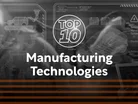Top 10: Manufacturing Technologies

Technology is reshaping the face of modern manufacturing, making it smarter, faster and more competitive on a global scale.
With automation, robotics, AI and the Internet of Things (IoT) driving innovation, production lines are more efficient than ever.
The numbers speak for themselves: by 2025, the global smart manufacturing market is set to soar to US$384.8bn, while AI in manufacturing is expected to hit US$16.7bn by 2026.
This tech revolution not only boosts productivity and reduces costs but also helps workers upskill, keeping companies agile in an ever-changing market.
With this in mind, Manufacturing Digital has taken a look at the top 10 technologies leading this revolution.
10. Cybersecurity solutions
Founded: 1903
Employees: 26,000
CEO: Blake D. Moret
Revenue: US$7.8bn
Rockwell Automation is setting the standard in industrial cybersecurity, responding to the rising need for stronger defences in manufacturing.
It recently acquired Verve Industrial Protection, expanding its expertise in keeping operations secure.
Covering every phase of an attack, its solutions address both IT and OT environments, enhancing security through continuous monitoring and threat detection, whilst partnering with firms like Claroty, ensures Rockwell can provide real-time insights.
Alarmingly, the company's research shows that 60% of critical infrastructure industries lack real-time threat detection and is stepping up to bridge that gap with 24/7 threat detection services.
9. Wearable technology
Founded: 1886
Employees: 402,600
CEO: Stefan Hartung
Revenue: US$88.2bn
Bosch is at the cutting edge of wearable technology, creating solutions that optimise safety and productivity on the factory floor.
Through advancements in Industry 4.0, their wearable devices, such as smart glasses and wristbands, boost worker safety and enable hands-free access to data.
Bosch’s devices integrate sensors for environmental monitoring and tracking movements, contributing to real-time decision-making.
With a focus on worker health, its wearables connect to a broader IoT ecosystem, making factories safer and more efficient while lowering risks of workplace incidents.
8. 5G connectivity
Founded: 1870
Employees: 145,653
CEO: Takehiko Kakiuchi
Revenue: US$141.4bn
Mitsubishi Electric is harnessing the power of 5G to transform manufacturing.
The high-speed, low-latency connectivity provided by 5G enhances real-time machine communication, supporting smart factories and advanced automation.
Mitsubishi’s adoption of 5G technology boosts data transfer rates for quality control and improves remote operations.
It also facilitates the deployment of autonomous guided vehicles (AGVs) and allows for real-time monitoring of manufacturing systems, resulting in better operational efficiency and greater flexibility.
7. Cloud computing
Founded: 1906
Employees: 97,000
CEO: Darius Adamczyk
Revenue: US$34.4bn
Honeywell is making waves in cloud computing for manufacturing, giving companies the tools to scale and adapt with ease.
Its cloud-based services include data analytics, remote monitoring and predictive maintenance, all geared towards optimising factory operations.
With cloud computing, manufacturers can access real-time data from anywhere, allowing for swift, informed decisions.
Honeywell's cloud solutions are key in enabling the integration of various systems, helping manufacturers reduce downtime, increase efficiency and stay agile in a competitive, data-driven industry.
6. Digital twin technology
Founded: 1847
Employees: 311,000
CEO: Roland Busch
Revenue: US$77.8bn
Siemens has established itself as a leader in digital twin technology, enabling manufacturers to create virtual replicas of their products and processes.
This simulation capability allows companies to test and optimise designs before making changes in the real world.
Siemens' digital twin solutions cover every stage of a product’s lifecycle, improving time-to-market and product quality while reducing risks.
Integrated with IoT and AI, Siemens' digital twin offerings help predict maintenance needs and improve overall efficiency. The technology empowers manufacturers to refine processes, minimise downtime and extend equipment life.
5. Immersive technologies
Founded: 1981
Employees: 23,000
CEO: Bernard Charlès
Revenue: US$5.6bn
Dassault Systèmes is at the forefront of immersive technology in manufacturing, leveraging augmented reality (AR), virtual reality (VR) and mixed reality (MR) through its 3DEXPERIENCE platform.
These technologies enable real-time 3D visualisation of products, enhancing collaboration and design efficiency.
On the factory floor, Dassault’s immersive tech is probably used for virtual assembly planning, reducing errors and optimising production before physical execution.
For maintenance and repairs, AR allows technicians hands-free access to real-time data and guidance, improving accuracy. Dassault’s solutions streamline processes, improve product quality and advance worker training.
4. Industrial Internet of Things (IIoT)
Founded: 1836
Employees: 128,000
CEO: Jean-Pascal Tricoire
Revenue: US$34.2bn
Schneider Electric leads the charge in Industrial Internet of Things (IIoT) with its EcoStruxure platform, helping manufacturers connect, monitor and analyse data in real-time.
By integrating IIoT, Schneider aims to improve energy efficiency and asset performance while reducing operational costs.
Its solutions involve AI-driven predictive maintenance, helping to prevent equipment failure and extend its lifespan.
Schneider’s IIoT offerings are also expected to improve supply chain management and production planning, ensuring factories are more responsive to shifting market demands, making manufacturers better equipped to boost productivity and achieve sustainability goals.
3. Artificial intelligence
Founded: 1993
Employees: 22,400
CEO: Jensen Huang
Revenue: US$26.9bn
NVIDIA has carved out a strong position in the manufacturing world, using its ground-breaking AI technology to drive efficiency and innovation.
Its powerful GPUs and software frameworks are at the heart of AI applications that handle real-time data analysis for quality control, predictive maintenance and process optimisation.
In manufacturing, NVIDIA's AI can spot defects faster and more accurately than traditional methods, streamlining production. With a focus on edge AI computing, NVIDIA’s solutions enable real-time decision-making on the factory floor, reducing reliance on cloud-based systems.
This is especially crucial in environments where speed is key. Its AI platforms are also enhancing demand forecasting and supply chain management, helping manufacturers to cut waste and boost efficiency, making NVIDIA a key player in AI-driven industrial advancements.
2. Additive manufacturing
Founded: 1892
Employees: 168,000
CEO: H. Lawrence Culp Jr.
Revenue: US$76.6bn
General Electric (GE) is pushing the boundaries of manufacturing with its leadership in additive manufacturing or 3D printing.
GE’s focus is on using 3D printing to create lighter, more efficient components, particularly in industries like aerospace. Its investment in proprietary 3D printing processes and materials has opened up new possibilities for complex designs, previously unattainable using traditional methods.
GE’s large-scale industrial 3D printers are probably capable of producing parts with unprecedented precision, significantly cutting production costs and shortening lead times.
The flexibility of additive manufacturing means that companies like GE can now create intricate components faster and more efficiently, driving forward innovation in manufacturing processes.
GE’s advancements in this field are contributing to the widespread adoption of 3D printing across industries, pushing the limits of what can be made.
1. Industrial automation and robotics
Founded: 1988
Employees: 105,000
CEO: Björn Rosengren
Revenue: US$29.4bn
ABB is a powerhouse in the field of industrial automation and robotics, providing manufacturers with cutting-edge tools to streamline production.
The company offers a broad range of robots, from nimble, co-bots for delicate tasks to large, robust machines designed for heavy-duty industrial work.
ABB’s automation systems are probably deeply integrated with AI and machine vision, allowing manufacturers to automate more complex processes with high precision.
ABB’s focus on digital solutions and the integration of IoT within its robotics platforms means smarter factories with improved efficiency, reduced downtime and enhanced quality control.
Its portfolio also includes advanced electrification products, creating a comprehensive suite of automation solutions that can modernise entire production lines.
ABB is undoubtedly driving the future of smart manufacturing, where flexibility and precision meet.
Make sure you check out the latest edition of Manufacturing Digital and also sign up to our global conference series - Manufacturing & Mobility LIVE
Manufacturing Digital is a BizClik brand.
- ABB: Expanding the Capabilities of the Electric MotorSustainability & ESG
- 'Engineered to Outrun': ABB's Sustainable Manufacturing PushSustainability & ESG
- TCS Launches NVIDIA Unit to Drive AI TransformationAI & Automation
- How is ABB Revolutionising Automotive Sustainability?Sustainability & ESG





